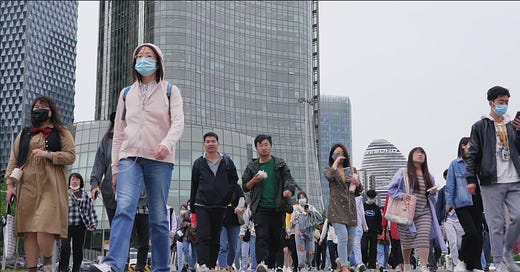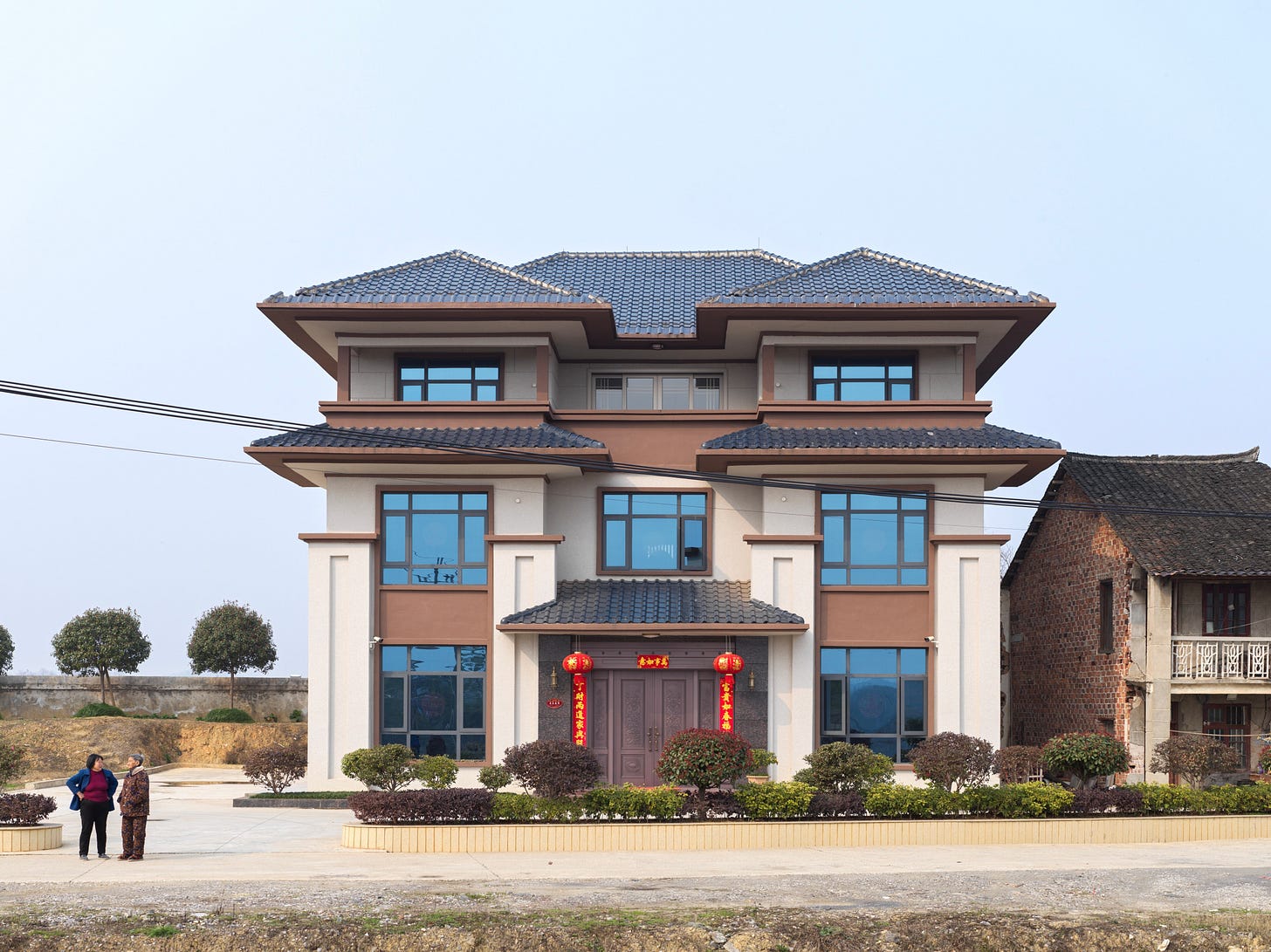China’s workplace sexual harassment problem + paying tribute to Pema Tseden
Also in issue 21: how Douyin shapes rural Chinese architecture and more
Hi there,
It’s Beimeng, Charlotte, and Yan.
The last few weeks have been a whirlwind. Between the three of us, we’ve been reporting, going on research trips, and finishing up a master’s thesis! But now we’re back and thrilled to reconnect with you, presenting a collection of stories that have captured our attention during this time.
In this issue, we begin with the reignition of the #metoo conversation in China. Almost two dozen women have accused Shi Hang, one of China’s most renowned screenwriters, of sexual harassment. Sanlian Lifeweek Magazine interviewed women on the street in Beijing, producing a video that provided a clear perspective on how prevalent the problem of workplace sexual harassment has been in China.
Then, we take a moment to honor Tibetan filmmaker Pema Tseden, whose sudden passing on May 8 at the age of 53 left a deep void in the film world.
Then, two lighter pieces — one on how Douyin (TikTok in China) is shaping the aesthetics and architecture in rural China, and another on a young artist’s paradoxical search for Utopia.
Far & Near is a completely independent, reader-funded, paywall-free newsletter, and we need your support to continue producing quality content. If you like our work, please consider becoming a paid member.
How common is sexual harassment in the workplace?
Trigger warning // sexual violence
In early May, prominent screenwriter Shi Hang was accused of sexual harassment by almost two dozen women, the majority of whom had worked with Shi in various professional settings. Shi responded by claiming that these cases were “relationships of various degrees”, which the women refuted. It prompted many to share personal stories about just how prevalent sexual harassment is in the Chinese workplace.
This man-woman-on-the-street interview, produced by Jacney Chan at Sanlian Lifeweek Magazine, was one of the very few visual stories published in the wake of the accusations, within a very much male-dominated Chinese media landscape.
These women represent diverse workplaces, from the film and media industry to state-owned companies. Their perpetrators, too, occupy different roles in their professional lives, from superiors and clients to colleagues. One woman in the video recounts a distressing experience where she was forced onto a couch and kissed by a co-worker at a company dinner, while others looked on. Another woman, now in a leadership role, shares her past struggles with navigating harassment from a client early in her career.
The women in the video point out inherent power imbalances in a deeply patriarchal society as the root cause for such behaviors, highlighting a reality where women’s autonomy and boundaries are often ignored and disrespected.
Watch the video.
2. Pema Tseden’s Legacy
The first Tibetan filmmaker to shoot a Tibetan-language feature film in China. An acclaimed filmography with seven (including two unreleased titles), all in Tibetan. But that’s just half the Pema Tseden story, echoing the title of his short story collection, "A Half-Told Story". Pema Tseden was also a prolific bilingual novelist, and a community-builder. His most priceless contribution was fostering a wave of Tibetan filmmakers and propelling the scene, the Tibetan New Wave, to international recognition.
Pema Tseden passed away from a sudden illness on May 8. He was 53. This newsletter hasn’t really covered feature films before, but we want to pay homage to his towering achievements. Pema Tseden’s calm and acute portrayal of the everyday Tibetan experience in clash with Han-imposed modernization is a reminder that a group of people doesn’t have to be romanticized or mystified, if their stories can be told through local eyes.
In 2016, Beimeng was fortunate to interview Pema Tseden in New York, where he said:
"[Foreign-made films about Tibet] sometimes pay excessive attention to ideology, and mainland [China] does the same, just with a rather different ideology… The previous Tibetan-themed films [made by China] used Han Chinese actors and delivered lines in Mandarin. I want to change that environment, by making films of our own.”
The films of Pema Tseden are a treasure of inspiration for socially conscious artists and viewers to draw ideas from.
There have been numerous heartfelt tributes written by Pema Tseden’s collaborators and friends, which give new insights into his personality and life. High Peaks Pure Earth translated two tributes that we found particularly moving.
If you’d like to watch Pema Tseden’s films, here are some viewing links that we found for you:
Click here if you are based internationally.
This link provides a variety of international and Chinese sources to watch his films.
3. “Why don’t you use Roman columns? It looks like we can’t afford it!”
When writer You Xudong visited his rural hometown of Shaoyang in Hunan province over Spring Festival, he was struck by grandiose fusion-style villas that had seemingly sprung up everywhere in recent years. Until a few years ago, these large mansions were a common sight in rural areas of relatively better-off eastern provinces such as Zhejiang and Fujian. Now, central China is catching up on the trend. The intriguing source of inspiration behind these curious designs: short video platforms such as Douyin and Kuaishou.
You and photographer Zou Biyu found that, in the universe of rural Chinese architecture, it doesn’t matter whether a villa is designed in Chinese style or European style, as long as Roman columns are involved. If anything, the European style dominates as it's cheaper.
Self-built village villas, or 农村自建房, are the embodiment of social status. They are “double insurance” - both for one’s future retirement and an offspring’s advantage in future marriage markets. People who have amassed wealth in big cities often choose to invest in these village villas. Whether they are built to last is of less relevance.
Local construction teams work with simple sketches or verbal descriptions, or via low-cost architectural “drawings” (from 9.9 RMB to a couple hundred) purchased from viral video producers specialized in rural villa designs. One, 住宅公园, told You that his company was built on a common pain point in rural China—the lack of a one-stop shop for building one’s own house.
Follow Zou’s photography (and You’s writing available in English on Sixth Tone) to see a landscape reshaped by algorithmic feeds and viral video aesthetics.
4. Fissure of a Sweet Dream
Photographer Yan Jialin was captivated by a small community of urban runaways in Wanning, a small town in Hainan province known as a surfing paradise. These free spirits had abandoned the pressures of city life, seeking solace in Wanning’s lush forests and wild beaches.
The softly-lit, idyllic images captured by Yan resemble a paradise of some sort, but in writing, she reflects more critically on these “utopias” and the paradox they present. Wanning is faced with limited opportunities and rising prices due to its growing popularity, which we observe is just like other utopian escape destinations Dali (Yunnan province) and Jingdezhen (Jiangxi province). Within a year, many young people Yan photographed had already moved on to other more affordable places, after possibly having contributed to the gentrification of Wanning themselves.
In the accompanying text Yan wrote about her project, she questions whether a utopia such as Wanning could last. The answer, we believe, is likely no, but the merit lies in the exploration of an alternative way of life, which increasingly feels like a necessity than a choice in China.
View the photos here.
Who we are:
Yan Cong is formerly a photojournalist currently pursuing a research MA in new media and digital culture in Amsterdam.
Beimeng Fu is a video journalist based in Shanghai. She is a lover of languages and documentaries.
Ye Charlotte Ming is a journalist and visual editor covering stories about culture, history, and identity. She’s based in Berlin.
Writers: Beimeng Fu, Charlotte Ming. Copy editor: Krish Raghav
If you like this post, please share it with others and consider becoming a paying member.
If you’d like to make a one-time donation, click here:








Hello! Beimeng, Charlotte, and Yan , Can you recommend 推播助栏 Enrich Podwave?